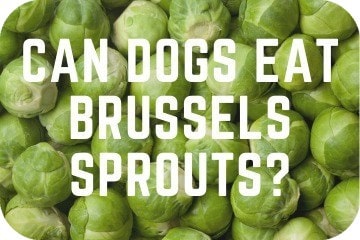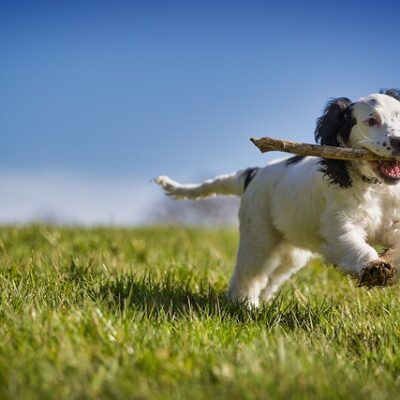Can dogs eat sprouts? Yes, Brussels sprouts are safe for dogs to eat. Brussels sprouts are not toxic to dogs. They contain essential vitamins and minerals, are high in fiber, and antioxidants.
Sprouts are a healthy treat for dogs, but make sure to feed them in moderation. Sprouts can cause flatulence and diarrhea.
Can dogs eat raw Brussels sprouts? They can, but they might be a bit tough and difficult to consume. Cooking them softens them and reduces the risk of intestinal blockages and choking.
Busy? Get Your Hands Paws On The Answers Quickly…
- What Are Brussels Sprouts?
- What Are The Benefits Of Brussels Sprouts For Dogs?
- What Are The Risks?
- How Do You Cook Sprouts For Dogs?
- 5 Other Green Vegetables Suitable For Dogs
- FAQs
WHAT ARE BRUSSELS SPROUTS?
- Brussels sprouts are a leafy green vegetable.
- They grow to around 1 inch in diameter and resemble a tiny cabbage.
- They are in the same family (cruciferous) as broccoli, cabbage, and kale.
- Sprouts are often served around the festive period. Typical on a Thanksgiving or Christmas table.
- They taste slightly bitter when raw or boiled, but can be cooked in a variety of ways (for humans) to help enhance the flavor.
WHAT ARE THE BENEFITS OF BRUSSELS SPROUTS FOR DOGS?
Keep Your Dog Regular
Sprouts are known as the vegetable to keep you and your pet regular.
Due to their high fiber content, sprouts can help keep the digestive tract moving.
Fiber can help boost energy too.
May Reduce Inflammation
Sprouts contain antioxidants that are thought to help to neutralize free radicals. Free radicals are reactive chemicals that can harm healthy cells. This can help decrease inflammation and may help to prevent illnesses like cancer (link) (link).
Can Help Blood Clot
Brussels sprouts contain vitamin K. Vitamin K is essential to your dogs’ health; it helps the blood to clot. This is vital as a vitamin K deficiency can cause excessive bleeding, should your dog be injured, which could result in death due to blood loss.
May Strengthen Bones
Vitamin K is present in sprouts. This vitamin is thought to strengthen bones, aid in bone growth, and may prevent osteoporosis.
Could Help Weight Loss
Brussels sprouts are low in calories. This means that they are great to add to your dogs’ food as they are filling and satisfying, without the fat or calories. Substituting high fat and calorific dog treats with sprouts and other greens, can result in weight loss. Remember to contact a nutritionist or veterinarian before drastically altering your dogs’ diet.
WHAT ARE THE RISKS?
Despite the many benefits of Brussels sprouts, there are a few reasons not to overindulge in them.
Flatulence (farting)
Sprouts don’t only make humans gassy, and they have the same effect on our canine companions.
Farting is a build-up of gas in the colon and intestinal tract. It is normal and not harmful to your dog; however, they may cause excessive farting, which can be uncomfortable for your dog.
Keep an eye on the number of sprouts they’re eating. If they express any kind of pain signals (stomach cramps, etc.) and are excessively passing wind, we suggest laying off the sprouts.
Diarrhea
Brussels sprouts are high in isothiocyanate, which is also present in broccoli, this helps to keep food moving through the digestive system, but too much can also cause diarrhea.
Your dog may end up with loose stools after consuming too many sprouts. If they do experience this, stop with the fibrous vegetable. If diarrhea continues, contact your veterinarian for advice. They usually will suggest a short fasting period, followed by a plain food diet, including plain chicken, white fish, rice, and sweet potato.
Added Ingredients
When we cook our sprouts over the festive period, we fry them off with garlic and bacon in butter and seasonings.
While this might enhance the flavor for us, it is not healthy, and ingredients like garlic are poisonous to dogs. Butter and bacon are high in fat, which can cause many health issues, including obesity.
If you are going to try feeding your dog sprouts, boil or steam them alone.
Stomach Upset
Some dogs don’t digest vegetables well. They can cause vomiting and diarrhea.
This can also happen if you introduce new foods into your dogs’ diet too quickly.
If you are introducing a new food, add it slowly to their existing food in small quantities, try 1/2 cooked sprout and go from there.
Brussels sprouts are not essential to their diet. If your dog experiences any adverse effects, slow down on the vegetables until they return to normal. There are plenty of other healthy options for them to try if sprouts don’t agree with them.
HOW DO YOU COOK SPROUTS FOR DOGS?
Dogs should only eat plain sprouts, which means most of the time, they shouldn’t be eating them from your plate. Salt and other additives can be harmful to your dog.
It is easy to cook them their own little batch and save them in the refrigerator as treats or add them into their existing food.
Ingredients:
- Brussels Sprouts
Directions:
1. Thoroughly rinse the sprouts.
2. Prepare the sprouts by removing the tough outer leaves.
3. Cut a cross into the base of the sprout.
4. Place a large pan over medium-high heat and fill with water.
5. Bring to the boil.
6. Once boiling, add the sprouts and boil for 3-5 minutes (depending on the size of your sprouts) until tender.
7. Drain the sprouts and allow them to cool before feeding to your dog.
5 OTHER GREEN VEGETABLES SUITABLE FOR DOGS
Many vegetables are great for adding minerals and vitamins to your dogs’ diet. They are perfect as low calorie, healthy, natural treats.
These shouldn’t be used in place of your dog’s regular meal, and are not essential. Your dogs’ food should contain all of the nutrients they require.
Make sure to introduce new vegetables slowly as any new foods can cause gastric upset.
All vegetables should be fed plain, do not add any seasonings, fats, oils, or other ingredients to enhance the flavor. Your dog will enjoy these vegetables raw, boiled, or steamed.
1. Broccoli – Part of the same family as sprouts, broccoli is a healthy snack for your dog. It is also great to add to homemade dog food.
Broccoli can be fed cooked or raw. It contains fiber and is low in fat, so it works as a great low-calorie additive.
If fed in too high quantities, it can cause diarrhea and vomiting due to it containing isothiocyanate. We have an article on Can Dogs Have Broccoli here.
2. Green Beans – Arguably one of the most favored among the dog community, green beans are an excellent choice.
They contain plenty of vitamins and can be used to make dog food or served alone as a low-calorie treat.
Green beans can be helpful for weight loss, and many people use them to pad out their dog’s dinner, making them feel fuller with a low-calorie vegetable.
3. Peas – Another great green for dogs is peas. Our puppies love to chase rolling peas around the kitchen.
They contain a variety of vitamins which are essential for dogs’ immune system. They contain a significant amount of fiber to help with your dog’s digestion.
Peas can be fed as a treat or mixed into their dog food.
4. Cucumber – Crunchy, low in calories, and high in water. Cucumber makes an excellent treat for dogs. Just ensure you chop it up to a suitable size to avoid chocking.
Cucumber is great as a refreshing treat on a warm day to help with hydration.
5. Zucchini – Low in calories, zucchini (or courgette), is great for helping an overweight dog slim down.
It also contains a variety of vitamins and minerals great for your dogs’ health.
It can be fed raw, boiled, or steamed to suit your dogs’ preference. Feed it as a treat, or add it to homemade dog food.
FAQS
What vegetables can dogs not eat?
There are many vegetables and fruits dogs cannot eat. These include onions, garlic, leek, avocado, mushrooms, part of the tomato and cherries, grapes, raisins, etc. Check out our list of Human Foods Dogs Can and Can’t Eat here.
Can dogs eat Yorkshire pudding?
Not really. They usually do not contain any ingredients which are thought to be lethal to dogs, but they are also not healthy or nutritionally beneficial.
Can dogs eat alfalfa sprouts?
Yes, in moderation, they are thought to be safe for your dog.
Looking for more pawsome posts? Check these out…
How To Make A Snuffle Mat
When Do Puppies Lose Their Teeth?
Disclaimer: Each dog is different, and every circumstance is different. All efforts have been made to provide accurate information. However, it is not provided by a qualified Veterinarian, Veterinarian Surgeon, or Behaviorist. The information provided is purely educational. The information should not be used as an alternative or substitute for medical care. If you have any health or medical concerns, contact a qualified Veterinary Surgeon or Veterinarian immediately.











No Comment! Be the first one.